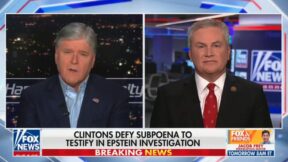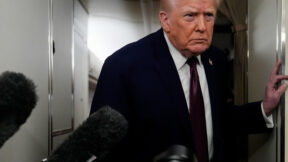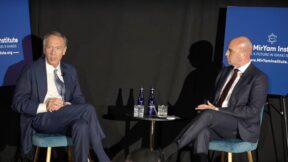WATCH: Five Different Reporters Ask Psaki if Our ‘Punishing’ Actions Will Make Putin Do More War Than He’s Already Doing
Five different reporters asked White House Press Secretary Jen Psaki if U.S. actions taken at President Joe Biden’s direction could cause Russian President Vladimir Putin to escalate, or even attack a NATO power.
At Monday’s daily briefing, the ongoing war being waged by Russia against Ukraine was the dominant topic, and one of the major themes was the threat of nuclear war.
But another recurring narrative was the idea that the “severe” actions that the U.S. has taken — the — could provide Putin with an excuse or a justification to intensify the already-devastating violence. In each case, Psaki returned the onus to Mr. Putin.
CNN White House correspondent Phil Mattingly was first to raise the issue, asking if there’s a line at which the US and allies believe Putin would consider their actions an “actor of war” and justification for an attack on a NATO power:
MR. MATTINGLY: (G)iven, I think, the speed and scale of the ramp-up on the sanction side of things over the course of the last 72 hours, does the U.S., European Allies have a — like, a threshold for which they view if you cross this, it would be viewed as an act of war by President Putin? As in, how do you calibrate your actions in terms of response and what may be coming back?
MS. PSAKI: Well, he was — he’s already in a war — committed an act of war, invaded a sovereign country.
MR. MATTINGLY: I mean for NATO countries or EU countries.
MS. PSAKI: Oh, you mean for NATO countries to act further, in terms of further military steps or further sanctions?
MR. MATTINGLY: As in, if you game out — as you game out what a response would be, given the scale of the sanctions package —
MS. PSAKI: Yeah.
MR. MATTINGLY: that was unveiled, is there a line that if we do this sanction or if we go this far, then that would for sure draw a response directly towards the U.S. or towards the EU from Russia?
ABC News White House correspondent Mary Bruce was next to hit the theme — four days after her colleague Cecilia Vega told President Biden that “sanctions have clearly not been enough” to deter Putin.
MS. BRUCE: Given the behavior that you have seen, some of the things that you just noted, and the very severe consequences that he is now facing — these severe sanctions — is there any concern that instead of retreating that Putin will feel so squeezed and so pressured that he will lash out even more, intensifying his attacks — that any of this could backfire, essentially?
MS. PSAKI: Well, I think that it is our responsibility — the United States, President Biden as a leader in the world — to rally the world in making clear how unacceptable his behavior is and to put in place severe consequences.
Now what he is feeling on the ground — there are protests, there have been oligarchs in his own cozy circle who have been outspoken. And obviously, the pinch is being felt significantly in the Russian economy, even if you just look at the fact that the market was closed today. The ruble has been plummeting. So those are the ways that he is feeling this.
He has a decision he can make to de-escalate. And certainly, we would welcome that decision.
CBS News White House correspondent Nancy Cordes followed up by asking if Putin is being left no “off-ramp.”
MS. CORDES: How great is the concern — this is sort of building on Mary’s question: How great is the concern that these sanctions are so punishing that, essentially, Putin will have nothing left to lose and no offramp?
MS. PSAKI: Well, the sanctions are punishing so that they will inflict significant consequences and change the outcome at the end of the day — and de-escalate at the end of the day. That is what they are intended to do.
NBC News White House correspondent Kristen Welker asked Psaki about the decision to expel 12 Russian diplomats, and asked if this step was “escalatory”:
MS. WELKER: Can you give us the thinking behind the decision?
And, again, following up on some of the lines of questioning that you’ve already gotten, could there be a backlash to this step? Is this escalatory?
MS. PSAKI: Well, let me first state that today’s action has been in the works for several months. We informed — the United States informed the United Nations and the Russian Mission to the United Nations that we were beginning the process of expelling 12 intelligence operatives from the Russian Mission who had abused their privileges of residency in the United States by engaging in espionage activities that are adverse to our national security. So, it takes some time to make those evaluations and that — again, those actions were — were in the works for months.
MS. WELKER: And your response to the Russian ambassador who called this a “hostile act”?
MS. PSAKI: I think the hostile act is committing espionage activities on our own soil.
Politico White House correspondent Eugene Daniels asked if Putin was being given an excuse to attack NATO allies:
MR. DANIELS: At the beginning, you kind of outlined all of the support being given not just by the United States but other countries who typically have not done so. But I wonder if you — if the administration has any concerns about how President Putin would use that as an excuse to escalate and possibly attack NATO Allies, considering his warnings about the West getting involved in this crisis?
MS. PSAKI: Well, I think it’s important to step back and remember who the aggressor is here. The aggressor is President Putin. The aggressor is the Russian military at the direction of President Putin into a sovereign country.
Watch above via Fox News and C-Span.





Comments
↓ Scroll down for comments ↓